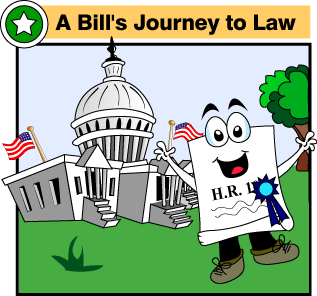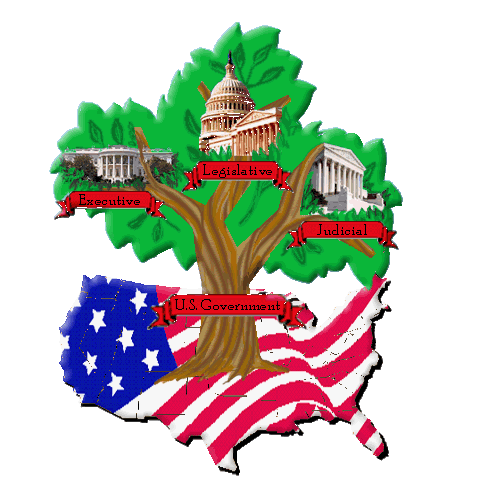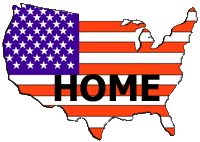Lesson Three: How Laws Are Made

Broad Goals:
Cognitive: The students will be able to confirm what a law is. They will also decide why laws are important. They will understand how a bill becomes a law and where it has to go to become effective. They will also discuss important laws that Abraham Lincoln worked on.
Affective: Students will explore the three branches of by creating their own diagram of how our government works. They will then pretend to be the House of Representatives and they begin to write up a bill that they will send through the different separation of powers. Students will learn that in a democracy we must all work together to make our laws. They will also learn that as a citizen they are allowed the opportunity to make a difference in their country, state, town, etc. The students will write a letter to a Senator Obama or Nancy Pelosi to demonstrate their rights in a democracy.
National Social Studies Standards:
• IV.h . Work independently and cooperatively to accomplish goals
• V.g. Show how groups and institutions work to meet individual needs and promote the common good, and identify examples of where they fail to do so
• VI.d. Recognize how groups and organizations encourage unity and deal with diversity to maintain order and security
• VI.b. Explain the purpose of government
Illinois State Standards:
• 4.A.1a. Listen attentively by facing the speaker, making eye contact, and paraphrasing what is said
• 4.A.1b Ask questions and respond to questions from the teacher and from group members to improve comprehension
• 4.B.1a Participate in discussions around a common topic
• 16.D.1 Describe key figures and organizations
• 18.B.1a Compare the roles of individuals in group situations
What the students did:
We talked about how our government is set up and the students made a tree to organize our government's system. We also talked about silly laws and read a book called, Chickens May Not Cross the Road and Other Crazy (But True) Laws, which highlighted some silly laws that are still in the law books today. We talked about the difference between a silly law and an important law and why having laws is so important to keeping our government organized!
Information discussed:
Government- The government keeps our country organized. What would your school be like if no one was in charge? What if there were no teachers or administrators? How would things get decided? We need people like the President, the Vice President, Governors, Senators, etc to keep our country from becoming too chaotic.
Democracy- governed by the people. This means that we are citizens have the right to vote and elect people in our government. Not every country has this opportunity, but we do because we are a free nation. Having a democracy is something that makes the United States very special.
Why is having a democracy so important in this country? It allows us to be free. Why?
How is our government set up? It is set up like a tree and has three branches. Each branch has a special job. This is also called the separation of powers. The three branches are: The Legislative Branch, The Executive Branch, and the Judicial Branch.
The Legislative Branch- make the laws. A group called The House of Representatives ( a group of people) come together and discuss what would be good laws for our country to have. In this group of people we have:
Congress: a group of legislators made up of two “houses. Which is made up of the House of Representatives and the Senate (2 houses)
Senators- 2 for every state; Since there are 50 states that means we have 100 senators representing us
House of Representatives- One house of the U.S. Congress, members are granted to each state based upon its population
Speaker of the House - She keeps the House of Representatives running smoothly. She is the one that makes sure that the House comes to an agreement. Our Speaker of the House is Nancy Pelosi.
They work together to write a bill. Does anyone know what a bill is?
Bill- A proposed law. It is written down and sent to the Executive branch before actually becoming a law.
In order for a bill to be sent more than half of each house has to vote that they like the bill before it can be sent to…
The Executive Branch- carries out the laws. Made up of the President and Vice President , and the Presidents closest advisors called The Cabinet. Once the House of Representatives have written up their bill (What is a bill again?) and they have voted on the bill, they send it to the President. The President is in charge of the Executive Branch. He decides whether or not he is going to sign the bill. By signing the bill, the bill becomes a law, however there are many times when the President will not sign the bill. If the President does not like the bill (and therefore does not sign it) he will veto the bill.
Veto- a fancy word meaning that the President stops a bill from becoming a law by not signing the bill
Cabinet- a group of the President's closest advisors
When the President vetoes the bill that means he did not agree with it or he did not like the way that it was written. Congress can override the President with a 2/3 vote.
With the information you have about the 2 branches so far, how much power do you think the President has over the making of laws?
How does Lincoln tie into all of this? Well as we know, Abe Lincoln was a lawyer, but what other position did he hold. (The President) So back when Abe Lincoln was around and he was President, do you think he was a part of the Legislative branch, the Executive branch, or the Legislative branch.
Well, while we have the branch that makes the laws, and the branch that carries out the laws, we need a branch to interpret the laws.
The Judicial Branch – interprets the laws. Made up of the Supreme Court. Interprets means they decide whether the law is constitutional or unconstitutional. What does that mean?
Constitutional- it follows what is said in our Constitution
Unconstitutional- does not follow what is said in our Constitution
US Constitution- A document that helps keep our government running by listing laws and amendments to laws
Amendments- changes to bills or laws
If the Supreme Court decides the law is unconstitutional then the law will no longer be a law.
How did Abe Lincoln represent this branch before he was President of the US ? He was a lawyer who represented people in court. Courts are a place where the laws are defended and interpreted. However, the Supreme Court is a bit different than some of the courts we've been talking about.
Supreme Court- The highest court of law
Does anyone remember how many cases Lincoln represented to the Supreme Court? How is the Supreme Court different than state court and federal court?
What kinds of laws did Lincoln work on when he was in office? “He supported a bill to prohibit slavery in any of the lands taken from Mexico . And he proposed a bill of his own to abolish slavery” (36).
Lincoln was an advocator for anti-slavery movement.
Slavery= “monstrous injustice”
What does it mean to abolish something?

